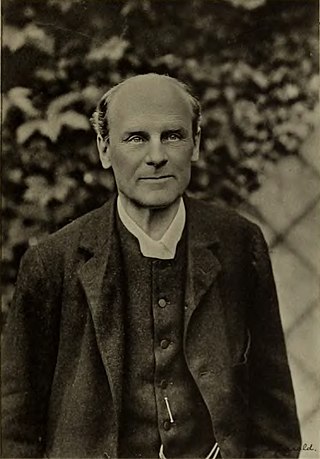
Arnold Frank Hills was an English businessman, sportsman, philanthropist, and promoter of vegetarianism.
Geoffrey Plumpton Wilson was an English amateur footballer who played at inside left. He made two appearances for England in 1900, scoring once. He was a member of the Corinthian amateur club and made three appearances for Southampton in 1901.
Thomas Charles Hooman was a leading English association football player of the Victorian era. He played for Wanderers in the 1872 FA Cup Final and was also chosen to represent England on several occasions.
Ernest Latimer Stones was an English amateur track and field athlete, who broke the world record for the pole vault at the Northern Counties Championships at Southport in June 1888. He cleared 11 feet 7 inches (3.53m) to beat by three-eighths of an inch the record then held by Thomas Ray of Ulverston. The record lasted for three years and one month until Richard Dickinson cleared 11 feet 9 inches (3.58m) at Kidderminster in July 1891.

Charles Guy Pym was a British Conservative Party politician.
Marshall Brooks was a nineteenth-century sportsman who was the British Amateur High jump champion in 1874 and 1876, world record holder for the High jump on three occasions, as well as a rugby union international who represented England in 1874.
Henry Anderson Bryden was an English solicitor, athlete and sportsman, playing rugby for England in 1874. He was a keen hunter and naturalist and travelled widely. He then became a professional author writing about wildlife and his hunting experiences.
Charles Arthur William Gilbert was an English cricketer. Gilbert was a right-handed batsman bowled both right-arm slow and right-arm fast. He was born at Melton Mowbray, Leicestershire.
Alfred Lubbock was an English insurance underwriter and banker. He is best known as an amateur cricketer who played first-class cricket for a variety of sides including Kent County Cricket Club and the Marylebone Cricket Club between 1863 and 1875. He was considered to be one of the best batsman of his era, comparable to WG Grace, and also played association football, playing for Old Etonians in the 1875 FA Cup Final.
William Middleton Tennent was an English athlete and cricketer who played for Lancashire County Cricket Club.
The Reverend Henry Charles Lenox Tindall was a British head master, priest and world-record-holding track athlete; he was also an English first-class cricketer active 1893–95 who played for Kent. He was born in Margate and died in Peasmarsh.
The 1923 WAAA Championships were the first national track and field championships for women in the UK. The tournament was held on 18 August 1923 at the Oxo Sport Grounds in London, United Kingdom.

The WAAA Championships was an annual track and field competition organised by the Women's Amateur Athletic Association (WAAA) in England. It was the foremost domestic athletics event for women during its lifetime.

Edward Southwell Garnier was an English first-class cricketer and clergyman.

William Snook was an English running champion, whose life was mired in controversy and ended in poverty.
The 1880 AAA Championships was an outdoor track and field competition organised by the Amateur Athletic Association (AAA), held on Saturday 3 July at Lillie Bridge Grounds, London, England. It was the first championships organised by the AAA, and it replaced championships held by the Amateur Athletic Club since 1866. Representatives of the Amateur Athletic Club handed over to the new association the challenge cups that had been competed for at their championship for presentation at the new competition. The prizes were presented by Lady Jersey, wife of the Earl of Jersey.
The 1895 AAA Championships was an outdoor track and field competition organised by the Amateur Athletic Association (AAA), held on Saturday 6 July 1895 at the Stamford Bridge (stadium) in London, England.
The 1900 AAA Championships was the 1900 edition of the annual outdoor track and field competition organised by the Amateur Athletic Association (AAA). It was held on Saturday 7 July 1900 at the Stamford Bridge (stadium) in London, England.
The 1919 AAA Championships was the 1919 edition of the annual outdoor track and field competition organised by the Amateur Athletic Association (AAA). It was held on Saturday 5 July 1919 at the Stamford Bridge Stadium in London, England.





